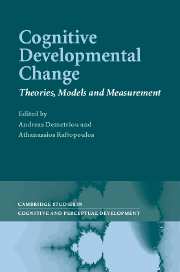Book contents
- Frontmatter
- Contents
- List of contributors
- Preface and acknowledgements
- Introduction: the what, how and why of developmental change: the emergence of a new paradigm
- 1 Mind, intelligence and development: a cognitive, differential and developmental theory of intelligence
- 2 Types of cognitive change: a dynamical, connectionist account
- 3 Developmental patterns in proportional reasoning
- 4 Building general knowledge and skill: cognition and microdevelopment in science learning
- 5 Cognitive change as strategy change
- 6 The emergence of mind in the emotional brain
- 7 Practices of quantification from a socio-cultural perspective
- 8 Contributions of central conceptual structure theory to education
- 9 Accelerating the development of general cognitive processing
- 10 Dealing with change: manifestations, measurements and methods
- 11 Dynamic modelling of cognitive development: time, situatedness and variability
- 12 Modelling individual differences in change through latent variable growth and mixture growth modelling: basic principles and empirical examples
- Index
- References
1 - Mind, intelligence and development: a cognitive, differential and developmental theory of intelligence
Published online by Cambridge University Press: 22 September 2009
- Frontmatter
- Contents
- List of contributors
- Preface and acknowledgements
- Introduction: the what, how and why of developmental change: the emergence of a new paradigm
- 1 Mind, intelligence and development: a cognitive, differential and developmental theory of intelligence
- 2 Types of cognitive change: a dynamical, connectionist account
- 3 Developmental patterns in proportional reasoning
- 4 Building general knowledge and skill: cognition and microdevelopment in science learning
- 5 Cognitive change as strategy change
- 6 The emergence of mind in the emotional brain
- 7 Practices of quantification from a socio-cultural perspective
- 8 Contributions of central conceptual structure theory to education
- 9 Accelerating the development of general cognitive processing
- 10 Dealing with change: manifestations, measurements and methods
- 11 Dynamic modelling of cognitive development: time, situatedness and variability
- 12 Modelling individual differences in change through latent variable growth and mixture growth modelling: basic principles and empirical examples
- Index
- References
Summary
Since the end of the nineteenth century, three fields of psychology have attempted to understand the human mind: cognitive, differential and developmental psychology. Each of these fields was and still is driven by different epistemological assumptions regarding the nature of the human mind, has adopted different priorities in regard to the aspects of the mind to be studied, and has used different methods for the investigation of the phenomena of interest.
Specifically, cognitive psychology focused primarily on the more dynamic aspects of mental functioning to explain how information from the environment is recorded, represented, stored and processed for the purpose of understanding, problem solving and decision making in real time. Thus, the primary aim of research and theory in this field was to model the flow and processing of information in the mind. In general, according to this tradition, the human mind is an information processing system operating under limited representational and processing resources. Therefore, three aspects of the mind are of utmost importance in this tradition: representational capacity, control of processing and efficiency. Change in the information processing tradition is conceived as increasing automatization of performance on a given task. This is equivalent to saying that, with experience and practice, the control of performance shifts from the monitoring and regulation of central control processes to the forces underlying the dynamic organization of task-specific performance and the inter-connection of the components involved in this performance with the task-relevant environmental stimuli (Broadbent 1971; Logan and Gordon 2001; Posner and Boies 1971).
- Type
- Chapter
- Information
- Cognitive Developmental ChangeTheories, Models and Measurement, pp. 21 - 73Publisher: Cambridge University PressPrint publication year: 2005
References
- 4
- Cited by

